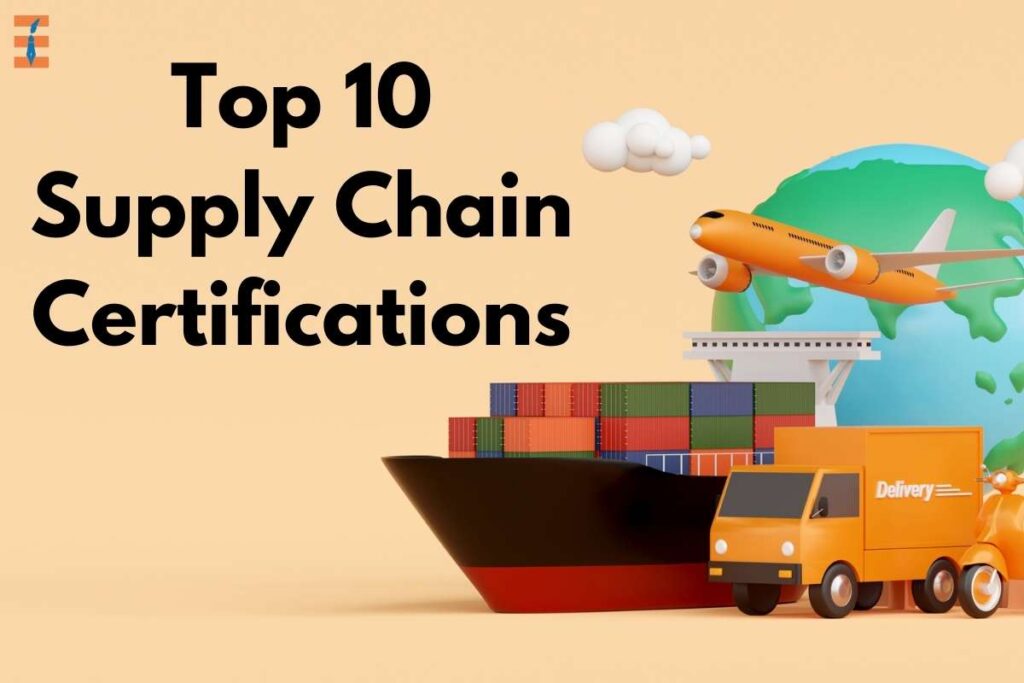Success in any field requires a commitment to lifelong learning. Supply chain and logistics work is the same. Keeping your knowledge and abilities up-to-date when new developments occur in your industry is essential if you want to maintain your position as a leader.
If you want to give your career a boost, getting a Supply Chain Certifications is a good place to start. Including a certification or qualification on your resume shows prospective employers that you are dedicated to your industry. In addition to helping you get a better career, a prestigious credential may help you advance in your existing position, both in terms of responsibility and compensation. Finally, there are benefits to continuing your education beyond just being at the forefront of your area.
Here are the Top 10 Supply Chain Certifications;
1. Project Management Professional (PMP)
The Project Management Institute (PMI) provides the Project Management Professional (PMP), which is typically regarded one of the most famous project management qualifications in the business. Earning this certification demonstrates that you have the knowledge and abilities to successfully manage projects. You need one of the following to be eligible for this Supply Chain Certification:
- Having a CAPM or 35 hours of training in project management in addition to a bachelor’s degree and three years of experience directing projects is preferred.
- Five years’ experience as a project manager, a high school graduation, and either the Certified Associate in Project Management (CAPM) credential or 35 hours of training in project management.
There are 200 questions in the actual test. To maintain your certification after passing, you must complete 60 PDUs in a three-year period. At least 35 of your PDUs need to come from professional development activities like seminars and workshops, and at least 25 need to come from helping others in the field like mentoring and volunteering.
2. APICS Certified in Production and Inventory Management (CPIM)
Earning the Certified in Production and Inventory Management (CPIM) credential from the Association for Operations Management (ASCM) demonstrates that you are an operations expert with a thorough grasp of production planning, forecasting, master scheduling, material management, and the interconnectedness of these processes throughout the entire supply chain.

Two tests, CPIM Part 1 and CPIM Part 2, must be passed within three years of each other to acquire this APICS Supply Chain Certification. While the first part of the CPIM curriculum covers the basics of supply chain management, the second part delves into the more advanced topics of resource and production planning and scheduling.
3. APICS Certified in Logistics, Transportation and Distribution (CLTD)
The Certified in Logistics, Transport, and Distribution certificate from APICS is also very valuable (CLTD). The CLTD certifies to potential employers that you are well-versed in the most effective methods for simplifying supply chain management. This training program certifies participants in warehouse operations, including inventory monitoring and ordering. Every five years, you’ll need to earn 75 PDPs to keep this certificate current.
4 APICS Supply Chain Operations Reference (SCOR-P)
The Supply Chain Operations Reference Professional (SCOR-P) program is a thorough Supply Chain Certification that helps you grow not just as a professional but as a person by expanding your knowledge of business processes, performance indicators, and best practices in supply chain management.
Successfully completing the exam demonstrates to potential employers that you have the knowledge and skills necessary to manage, measure, and enhance supply chain performance in all areas. A three-day training session is required before taking the SCOR-P test for Supply Chain Certification. The actual examination consists of 60 multiple-choice questions and takes two hours to complete on a computer.
5. ISM Certified Professional in Supply Management (CPSM)
To demonstrate your mastery of the field of supply management, you may take the Certified Professional in Supply Management (CPSM) exam offered by the Institute for Supply Management (ISM). Minimum three years of experience in supply chain management, outside of a support or clerical function, is required to sit for the certification examinations. After earning the necessary work experience, you’ll need to take and pass three separate tests. To keep your credentials current, you must complete 60 hours of continuing education every four years.
6. ISM Certified Professional in Supplier Diversity (CPSD)

The Certified Professional in Supplier Diversity (CPSD) certification is yet another supply chain credential provided by ISM. You need either three years of experience in supplier management or diversity, or five years of professional experience overall, to be eligible for this certificate. Once you achieve these qualifications, you have to take and pass two distinct tests. If you already have your CPSM Supply Chain Certification under your belt, you won’t have to take the same basic exam again to get your CPSD certificate.
7. CSCMP SCPro Certification
Three tiers of the SCPro Supply Chain Certification, offered by the Council of Supply Chain Management Professionals (CSCMP), test your understanding of and proficiency with various supply chain management processes. This credential confirms that you can evaluate real-world scenarios, identify problems within an organization, design better processes for handling supply chain operations, and put them all into practice successfully in the form of a well-planned project. There are prerequisites and exams for each tier of this certification procedure.
- SCPro level one:
You need a bachelor’s degree or four years of professional experience in supply chain management to take the level one test. There are a total of 160 multiple-choice questions spread out across eight parts, and you’ll have four hours to finish the test.
- SCPro level two:
You’ll need a level one certification and either a bachelor’s degree and three years of relevant professional experience or seven years of experience in supply chain management before you can take the level two test. You will be provided with a business case and asked to write an essay-style case study analysis. You’ll have four hours to finish the test.
- SCPro level three:
The third and final level of SCPro Supply Chain Certification requires not just the previous two levels, but also either a bachelor’s degree and five years of relevant professional experience, or nine years of experience in supply chain management. In place of a written test, students at this level will be asked to demonstrate their understanding by doing an in-depth investigation of a real business and designing a project that will help that business solve its problems and achieve tangible goals. During this phase, you’ll be partnered with a professor who will serve as a guide, and your work will be evaluated by a group of supply chain management professionals.
8. SOLE Certified Professional Logistician (CPL)
The International Society of Logistics (SOLE) is a non-profit organization where you may study to become a Certified Professional Logistician (CPL). Acquiring this certification is beneficial whether you work in the educational, governmental, military, or commercial sectors, since logistics play a significant role in supply chain management in each of these disciplines. You must meet one of the following requirements to sit for the CPL examination:

- Proficient in two or more areas of logistics and nine years of experience either teaching or working in the field.
- minimum of a baccalaureate degree and five years of experience
- In addition to a master’s degree, four years of experience in the field are also required.
- A doctorate degree and three years of relevant experience
- The eight-hour certification examination is broken up into four parts. Each question has many possible answers.
9. NCMA Certified Professional Contract Manager (CPCM)
The National Contract Management Association (NCMA) offers numerous credentials; the Certified Professional Contract Manager (CPCM) certificate stands out as the most useful in the field of supply chain management due to its breadth of coverage. This credential is meant for contract managers who work in commercial and government companies, but you may also pursue either the Certified Federal Contract Manager (CFCM) or the Certified Commercial Contract Manager (CCCM) if you’re just interested in one field. With this certification under your belt, you can demonstrate to potential employers that you have the knowledge and abilities necessary to handle contracts effectively, regardless of sector.
10. APICS Certified Supply Chain Professional (CSCP)
The Association for Supply Chain Management, a supply chain education program offered by the American Production and Inventory Control Society (APICS), was only recently founded (ASCM). Employers can see that you have a firm grasp of the most important methods, ideas, and technologies in supply chain management if you have the Certified Supply Chain Professional (CSCP) certificate on your CV.
You require three years of experience, a bachelor’s degree, or a current CLTD, CPIM, CTL, CPSM, CPM, SCOR-P, CIRM, or CFPIM certification to sit for the CSCP test. Certificate holders from the Association for Operations Management in Supply Chains (APICS) may be found in
Conclusion
Supply Chain Certification programs sharpen your work skills and open the doors to new opportunities for you in the market. Supply Chain Management is the trending field that requires consistent upgradation and these certification programs will put you at the focus of the field so that you will receive a bird-view. We hope you enjoyed reading this blog and understood what different Supply Chain Certifications are available in the market.
Also read: Top 7 Business Analyst Certifications

